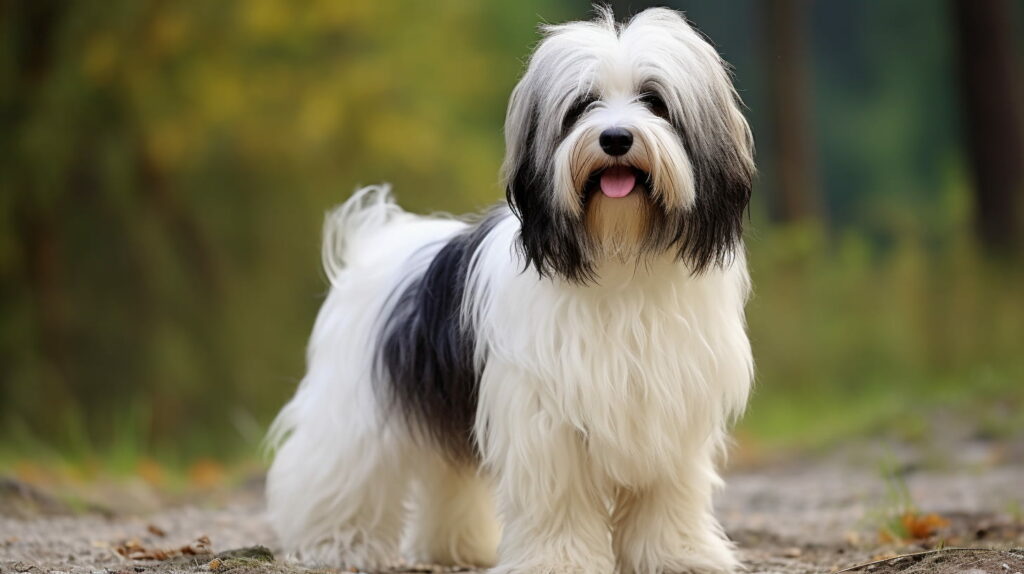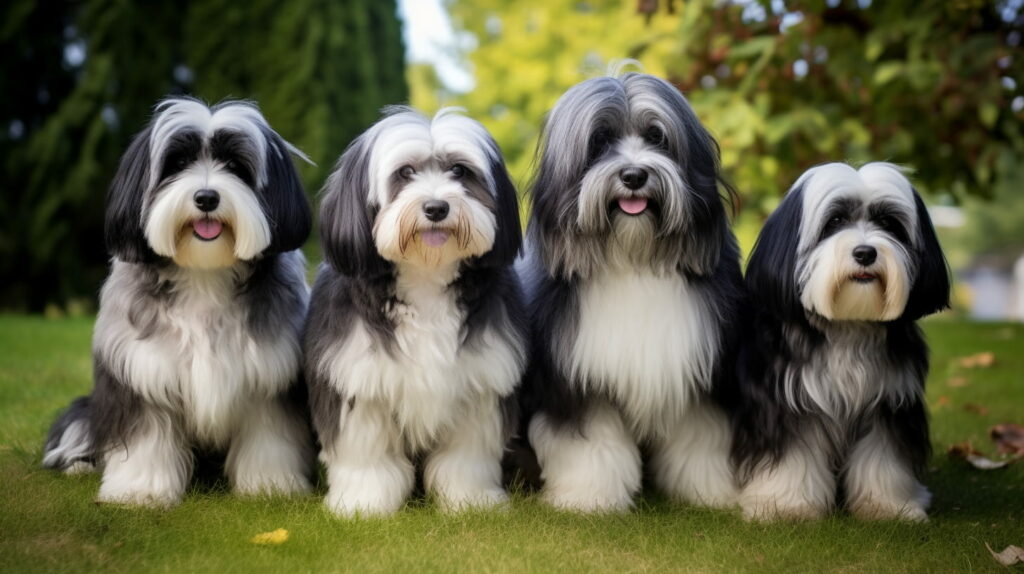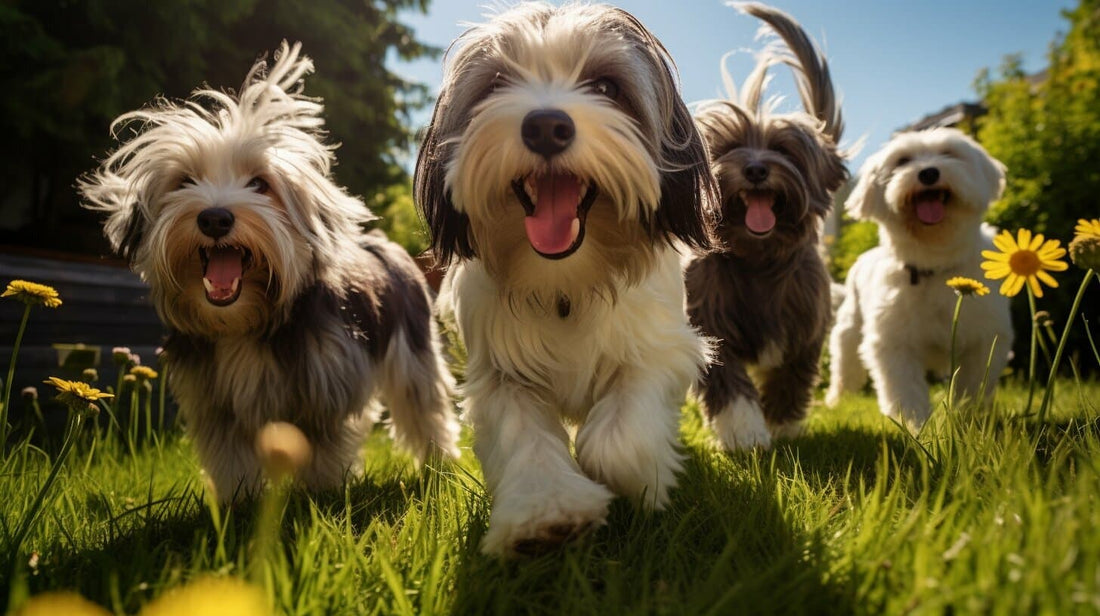Welcome to our guide on the delightful and adorable Tibetan Terrier breed. If you're considering adding a new furry friend to your family, Tibetan Terriers make loving and loyal companions. This guide will provide you with valuable information on their history, characteristics, temperament, care, and training. We hope this guide will help you make an informed decision on whether a Tibetan Terrier is the right breed for you.

Key Takeaways:
- Learn about the playful and loyal nature of Tibetan Terriers.
- Discover the rich history and origin of this breed.
- Understand the key characteristics and traits of Tibetan Terriers.
- Find out why Tibetan Terriers make excellent family dogs.
- Learn about proper care, grooming, and training for your Tibetan Terrier.
- Get insights into finding and welcoming a Tibetan Terrier puppy into your home.
- Understand the importance of health considerations, exercise, and socialization for your Tibetan Terrier.
The History of the Tibetan Terrier
The Tibetan Terrier, also known as the "Holy Dog of Tibet," has a long history dating back to the ancient monasteries of Tibet. Despite their name, they are actually not a true terrier, but rather a member of the utility group. They were highly respected and cherished by the Tibetan monks, who believed that they brought luck and happiness to those who owned them.
The Tibetan Terrier breed was considered a symbol of good luck and was gifted to esteemed individuals as a gesture of respect. It wasn't until the late 1800s that the breed was introduced to the western world by a British surgeon who received a pair of Tibetan Terriers as a gift. Over time, the breed gained popularity among dog enthusiasts, with their playful and loyal nature endearing them to many.
The Role of Tibetan Terriers in Tibetan Monasteries
Tibetan Terriers were originally bred to serve as companions to Tibetan monks and herding dogs for their flocks of sheep and goats. They were highly valued for their ability to navigate the rugged terrain of the Himalayan Mountains and their resilience to harsh weather conditions.
Their role within the monasteries extended beyond their practical purposes, as they were also regarded as spiritual guardians. It was believed that they could sense negative energy and ward off evil spirits, making them an essential part of monastic life.
The breed's history and significance can still be seen in their temperament and characteristics today. Tibetan Terriers are renowned for their loyalty, affectionate nature, and strong sense of intuition.
Characteristics of the Tibetan Terrier Breed
The Tibetan Terrier breed is a highly distinguishable and unique dog known for their playful and loyal nature. These dogs are medium-sized and have a square appearance with a sturdy build. Despite their name, Tibetan Terriers are not actually terriers, but rather belong to the non-sporting group of dog breeds.
| Size | Tibetan Terriers typically weigh between 18 to 30 pounds and stand at a height of 14 to 16 inches at the shoulder. |
|---|---|
| Appearance | Their long and thick double coat comes in a variety of colors and patterns, including white, black, gold, or a combination of these colors. |
| Physical Attributes | Tibetan Terriers have large, round feet with hair between the toes, which provide them with excellent traction. They also have a feathered tail that curls over their back. |
One of their most unique characteristics is their friendly nature. Tibetan Terriers are known for being social and outgoing, which makes them great family pets. They are also very adaptable and can do well in different living environments, including apartments and houses.
Overall, the Tibetan Terrier breed is an excellent choice for those looking for a lively and loyal companion with a distinctive appearance and friendly demeanor.
The Playful Nature of Tibetan Terriers
Tibetan Terriers are renowned for their energetic and lively personality. Their playful nature is one of the many reasons why they make such fantastic companions. These dogs are always up for a game or a romp, and they thrive on attention and interaction with their owners.
Tibetan Terriers are highly intelligent and love to learn new things. They excel in activities such as agility and obedience training, and they are always eager to please their owners.
Due to their playful nature, Tibetan Terriers require plenty of exercise to keep them healthy and happy. They love to go on walks, runs, and play in the yard or park. Without sufficient exercise and mental stimulation, they can become bored and destructive.
Playing with your Tibetan Terrier is an excellent way to bond with them and strengthen your relationship. They love toys, especially those that challenge their minds and keep them engaged.
The Tibetan Terrier as a Family Dog
The Tibetan Terrier is known for its friendly and sociable nature, making it an excellent family dog. These dogs are adaptable and get along well with children, other dogs, and even cats, making them a great addition to any household.
One of the most endearing characteristics of Tibetan Terriers is their loyalty. They form strong bonds with their human family members and are protective of them, making them a great watchdog.
Despite their small size, Tibetan Terriers are also known for their playful nature. They love to entertain their families with their playful antics, making them a great source of joy and laughter in the home.
Overall, the Tibetan Terrier is an ideal family dog for those seeking a loyal, playful, and friendly companion. Their adaptability and sociable nature make them perfect for families with children and other pets, and their love for playtime and attention ensures they will bring endless joy to their human family.

The Importance of Proper Tibetan Terrier Care
Tibetan Terriers are a unique breed with a beautiful and distinctive coat that requires regular grooming. Proper care is essential to keep them healthy, comfortable, and happy. Here are some important tips to keep in mind:
Grooming
Their long and thick coat requires regular brushing to prevent matting and tangling. You should aim to brush their coat at least two to three times a week with a slicker brush or a metal comb. Regular bathing is also recommended, but not too frequently as it can strip their coat of natural oils. It's essential to trim their nails, clean their ears and teeth, and check for any signs of skin irritation regularly. Engaging professional groomers can also be beneficial, especially for intricate haircuts.
Diet and Exercise
Proper nutrition is essential to keep your Tibetan Terrier healthy. A balanced and nutritious diet that meets their dietary needs is essential, and you should always provide them with fresh water. They are an active breed that requires regular exercise to stay healthy and happy. Daily walks, playtime and interactive games are recommended to keep them mentally and physically stimulated.
Veterinary Care
Regular check-ups with your veterinarian are necessary to maintain the health of your Tibetan Terrier. It's important to keep them up to date with their vaccinations, deworming, and flea/tick prevention. Any signs of illness or injury should be addressed promptly to prevent further complications.
Temperament and Socialization
Tibetan Terriers are social dogs that thrive on human companionship and interaction. Proper socialization is essential for them to develop good behavior around other dogs and people. Early socialization can help prevent shyness, aggression, and other behavioral problems.
Overall, proper care is essential to providing your Tibetan Terrier with a happy and healthy life. A well-cared-for Tibetan Terrier will reward you with many years of love, loyalty, and companionship.
Training a Tibetan Terrier
If you have decided to bring home a Tibetan Terrier, it's essential to start training them from an early age. Tibetan Terriers are intelligent, obedient, and eager to please their owners, making them relatively easy to train.
However, it's crucial to use positive reinforcement methods that focus on rewards and praise rather than punishment. Tibetan Terriers respond well to training that is consistent, patient, and fun.
Socializing your Tibetan Terrier
Socializing your Tibetan Terrier from an early age is vital for their overall behavior. Tibetan Terriers have a friendly and sociable nature, and it's essential to expose them to different people, animals, and environments to develop their confidence and social skills.
Early socialization also helps to prevent behavioral problems such as excessive barking, aggression, and separation anxiety. Take your Tibetan Terrier to dog parks, enroll them in puppy classes, and introduce them to different experiences.
Remember to supervise their interactions carefully and avoid overwhelming them. With proper socialization, your Tibetan Terrier will grow up to be a confident and well-rounded companion.
Finding a Tibetan Terrier Puppy
Before bringing home a Tibetan Terrier puppy, it's essential to find a reputable breeder or adoption agency that prioritizes the health and well-being of their dogs. Here are some tips for finding the perfect Tibetan Terrier puppy:
Research breeders
Look for breeders who have experience with Tibetan Terriers and follow responsible breeding practices. They should be willing to answer your questions, provide health certificates for their puppies, and allow you to meet the puppy's parents.
Consider adoption
Adopting a Tibetan Terrier from a rescue organization or shelter can be a rewarding experience. It's a chance to give a deserving dog a forever home while also saving a life.
Choose the right puppy
When selecting a puppy, consider your lifestyle and personality. Look for a puppy that matches your energy level and temperament. Take the time to observe the puppy's behavior and temperament, and ask the breeder or adoption agency for advice.
Prepare for the puppy's arrival
Before bringing your new puppy home, ensure that you have all the necessary supplies and equipment. This includes a crate, food and water dishes, toys, and a collar and leash. Create a safe and comfortable space where the puppy can feel secure and adjust to their new surroundings.
Remember, a Tibetan Terrier puppy is a long-term commitment that requires time, patience, and care. By taking the time to find the right puppy and prepare for their arrival, you can ensure a long and happy life together.
Welcoming your Tibetan Terrier Home
Bringing home a Tibetan Terrier can be an exciting and joyous experience. However, it's important to ensure that your new furry friend feels safe, comfortable, and loved. Here are a few things you can do to make your Tibetan Terrier feel at home:
- Create a designated space for your Tibetan Terrier: Prepare a cozy and comfortable bed for your new family member. Place it in a quiet and accessible area where they can relax and feel secure.
- Introduce your Tibetan Terrier to family members and pets gradually: Provide your new pup with some time to adjust to their new surroundings. Introduce them to other pets and family members one at a time, in a calm and controlled environment.
- Start a routine: Establishing a routine is essential to help your Tibetan Terrier feel secure and stable. Schedule feeding times, walks, and playtime at regular intervals each day.
Remember that Tibetan Terriers are affectionate and social creatures, so make sure to shower them with love and attention. As they settle into their new home, they'll need plenty of reassurance and patience as they adjust to their new surroundings.
Health Considerations for Tibetan Terriers
Tibetan Terriers are generally healthy dogs with a lifespan of 12-15 years. However, like all breeds, they are prone to certain health conditions that owners should be aware of. Regular veterinary check-ups can help identify any health issues early on.
| Health Condition | Description |
|---|---|
| Progressive Retinal Atrophy (PRA) | A genetic condition that causes gradual vision loss and can lead to blindness. |
| Patellar Luxation | A condition where the kneecap dislocates from its normal position, causing lameness. |
| Hip Dysplasia | A condition where the hip joint doesn't develop properly, leading to arthritis and lameness. |
| Autoimmune Disorders | Tibetan Terriers are prone to several autoimmune disorders, including thyroid disease and allergies. |
Owners should also be aware of their Tibetan Terrier's dental health. Regular teeth brushing and annual dental cleanings can prevent periodontal disease, which can lead to tooth loss and other health complications.
Preventive care measures, such as keeping up with vaccinations and tick prevention, can also help keep Tibetan Terriers healthy. Be sure to discuss any concerns or questions with your veterinarian.
The Exercise and Mental Stimulation Needs of Tibetan Terriers
Tibetan Terriers are active and energetic dogs that require regular exercise and mental stimulation to maintain their physical and mental health. Providing them with enough exercise and activities can prevent them from developing destructive behaviors out of boredom and keep them happy and healthy.
Their exercise needs vary based on their age, health, and lifestyle, but generally, they need at least 30-60 minutes of moderate-intensity exercise every day. This can include walks, runs, hikes, or playing fetch, depending on their preferences and physical abilities.
It is essential to keep them on a leash during walks or hikes, as they have a strong prey drive and tend to wander if not supervised. Enclosed spaces like dog parks can be an excellent option for them to socialize with other dogs and release their energy in a safe environment.
In addition to physical exercise, mental stimulation is equally important for Tibetan Terriers. They are intelligent dogs that enjoy learning new things and solving puzzles. Engaging them in activities like obedience training, agility courses, or trick training can keep them mentally stimulated and improve their problem-solving abilities.
Interactive toys like puzzles, treat-dispensing toys, and chew toys are also great for mental stimulation and can keep them occupied for hours. Be sure to rotate their toys frequently to maintain their interest and prevent boredom.
In conclusion, providing enough exercise and mental stimulation is crucial for the overall health and well-being of your Tibetan Terrier. With proper attention and care, they can live a happy and active life by your side.
Socializing Your Tibetan Terrier
Socializing your Tibetan Terrier is a crucial part of their upbringing. It helps them to develop confidence and good behavior. It also enables them to interact well with different people, animals, and environments.
Introduce your puppy to various stimuli from an early age. Let them play with other puppies and adult dogs in a supervised and controlled environment. Take them to new places, such as parks, beaches, and pet-friendly stores. Allow them to meet different people such as family members, friends, and strangers.
Expose them to different sounds, smells, and textures to help them get used to new sensory experiences. This could include objects such as vacuum cleaners, bicycles, and different surfaces like tiles, carpets, and grass.
Remember to always supervise your Tibetan Terrier during socialization and make sure they have positive experiences. Praise them for good behavior and give them treats to reinforce their positive actions.
Proper socialization will help your Tibetan Terrier to grow into a well-adjusted and friendly dog. It will also help them to develop good social skills, which will make them a delightful companion for you and other people.
Conclusion
After reading this guide, it’s clear that Tibetan Terriers are a wonderful addition to any family. Their playful and loyal nature makes them ideal companions for children and adults alike.
We have explored the history and characteristics of this unique breed, as well as the importance of proper care and training. From finding the right puppy to socializing them properly, we have covered all the essential aspects of owning a Tibetan Terrier.
Remember, owning a dog is a great responsibility, but with the right knowledge and commitment, it can be an enriching and rewarding experience. So if you’re considering adding a new furry friend to your family, a Tibetan Terrier could be the perfect choice!
FAQ
Q: How big do Tibetan Terriers get?
A: Tibetan Terriers are medium-sized dogs, with males typically weighing between 18-30 pounds and females weighing between 18-28 pounds.
Q: What is the lifespan of a Tibetan Terrier?
A: On average, Tibetan Terriers have a lifespan of 12-15 years. With proper care and a healthy lifestyle, some Tibetan Terriers have been known to live even longer.
Q: Are Tibetan Terriers good with children?
A: Yes, Tibetan Terriers are known for their friendly and affectionate nature, making them great companions for children. However, it is important to supervise interactions between young children and dogs to ensure safety for both.
Q: Do Tibetan Terriers require a lot of grooming?
A: Yes, Tibetan Terriers have a long, thick coat that requires regular grooming to prevent matting and keep it looking its best. Daily brushing and occasional professional grooming are recommended.
Q: Are Tibetan Terriers easy to train?
A: Tibetan Terriers are intelligent and eager to please, making them generally responsive to training. However, consistency, positive reinforcement, and patience are key to successfully training a Tibetan Terrier.
Q: Do Tibetan Terriers shed?
A: Yes, Tibetan Terriers do shed. However, their shedding is minimal compared to some other breeds. Regular brushing helps to manage shedding and keep their coat healthy.
Q: Can Tibetan Terriers live in apartments?
A: Yes, Tibetan Terriers can adapt well to apartment living, as long as they receive regular exercise and mental stimulation. They are not overly active indoors and are known for their adaptability.
Q: Are Tibetan Terriers hypoallergenic?
A: Tibetan Terriers are often considered hypoallergenic because they have a low-shedding coat. However, it is important to note that no dog is completely hypoallergenic, as allergies can vary from person to person.
Q: Are Tibetan Terriers good with other pets?
A: Yes, Tibetan Terriers generally get along well with other pets when properly socialized. They have a friendly nature and can form strong bonds with other animals in the household.
Q: Are Tibetan Terriers good watchdogs?
A: While Tibetan Terriers are not known for being aggressive, they have a keen sense of hearing and can alert their owners to potential intruders. Their alertness and protective instincts make them capable watchdogs.


